Background
The son of a tradesman, Julien de La Mettrie was born in Saint-Malo in Brittany on December 25, 1709. He was the son of a prosperous textile merchant.



(This collection of literature attempts to compile many of...)
This collection of literature attempts to compile many of the classic works that have stood the test of time and offer them at a reduced, affordable price, in an attractive volume so that everyone can enjoy them.
http://www.amazon.com/gp/product/1534647112/?tag=2022091-20

(In this fifth collection of La Mettrie's writings, he tak...)
In this fifth collection of La Mettrie's writings, he takes on erotics ("Voluptuousness" and two shorter texts), aesthetics or art ("Essays on Intellect and Fine Minds"), and ethics and religion (selections from "Ouvrage de Pénélope"). La Mettrie was a bold proponent of freedom of thought, no matter what the consequences. Here he offers a hedonistic or pleasure-based program for human happiness and fulfillment, which is also a rigorous ethical system, requiring high standards of conduct, intelligence, and achievement. Each of these texts is unabridged and presented here in their first-ever English translations.
http://www.amazon.com/gp/product/B014RGHWZI/?tag=2022091-20
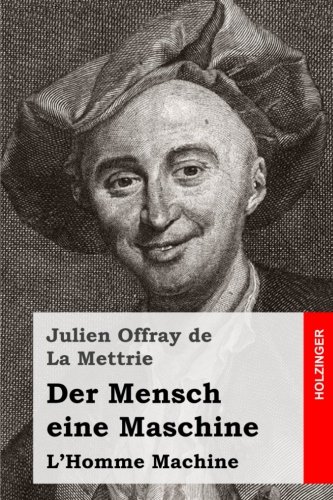
( Julien Offray de La Mettrie: Der Mensch eine Maschine. ...)
Julien Offray de La Mettrie: Der Mensch eine Maschine. L'Homme Machine Edition Holzinger. Taschenbuch Berliner Ausgabe, 2016, 4. Auflage Durchgesehener Neusatz mit einer Biographie des Autors bearbeitet und eingerichtet von Michael Holzinger • Erstdruck: Leiden 1747, vordatiert auf 1748. Der Text folgt der deutschen Übersetzung durch Adolf Ritter von 1875. Originaltitel: L'homme plus que machine Textgrundlage ist die Ausgabe: • La Mettrie: Der Mensch eine Maschine. Übersetzt, erläutert und mit einer Einleitung versehen von Adolf Ritter. Berlin: Erich Koschny, 1875 (Philosophische Bibliothek, Bd. 67). Herausgeber der Reihe: Michael Holzinger Reihengestaltung: Viktor Harvion Gesetzt aus der Minion Pro, 11 pt.
http://www.amazon.com/gp/product/1537657542/?tag=2022091-20
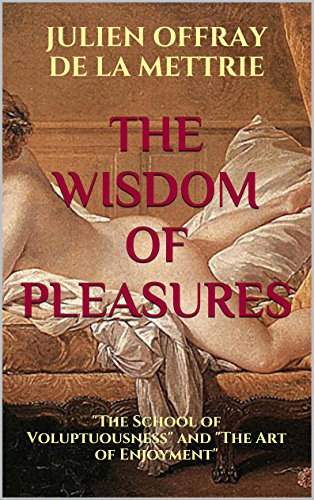
(He's known for his audacious claim in 'Man a Machine' tha...)
He's known for his audacious claim in 'Man a Machine' that humans can be reduced to their mechanism: but La Mettrie wrote other books too. In these hidden gems, the most radical of all Enlightenment thinkers lays bare his hedonistic ideas. In a godless universe that seems to be engineered only around pleasure and pain, how should we act? Should we just give in to all-out debauchery as our destiny, or is there a nobler path? This is the first-ever English translation of these books, which were originally published in 1747 and 1751. This edition has a fully functional table of contents and original footnotes.
http://www.amazon.com/gp/product/B00NXKCH5K/?tag=2022091-20
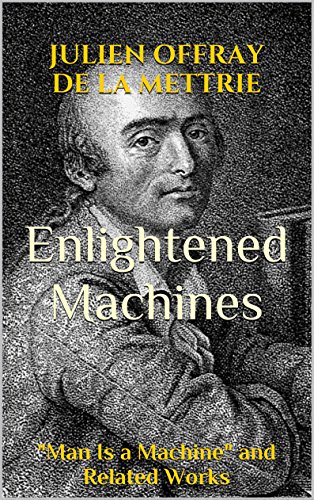
("Let us boldly conclude that Man is a Machine; and that i...)
"Let us boldly conclude that Man is a Machine; and that in the whole universe there is only a single substance, modified in various ways." In La Mettrie's thought, humans, animals, plants, and all that lives are equal: either all of them have souls (whatever is meant by that word) or none do. He emphasized the "uniformity of nature" and the analogies between so many organs in humans and other animals, including plants. He even developed an evolutionary hypothesis well ahead of Darwin. This collection contains the following works, most of which have never been fully translated before now: -The Natural History of the Soul -Man Is a Machine (AKA Man-Machine or Man a Machine) -Man Is a Plant -Animals Are More than Machines -An Epistle to My Mind -The Little Man with a Long Tail
http://www.amazon.com/gp/product/B013VPV5GS/?tag=2022091-20
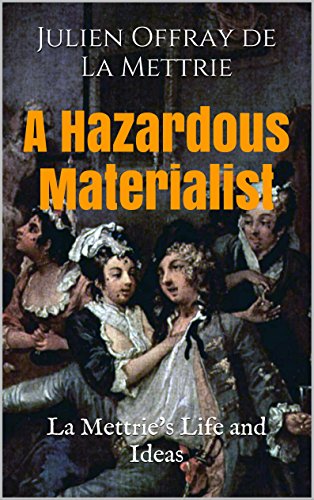
(A "bold atheist", a "renowned glutton", an "enemy of doct...)
A "bold atheist", a "renowned glutton", an "enemy of doctors", a "mad imagination", an "overly joyful man", a purveyor of "incoherent lunacy" - and that's just what Voltaire thought about him. Several times a refugee for his writings, a man who stood alone against both Christianity and the medical establishment, La Mettrie is a lost icon of free speech and moral courage. Instead, both during his life and for generations after death, La Mettrie became the iconic "bad atheist" - a favorite target of Christian apologists, but also "the whipping-boy of French materialism" who was definitively rejected by the leading philosophes. This collection, which contains new or first-ever translations of over a dozen historical texts, offers a second opinion on a man who was far ahead of his time: a brilliant theorist of materialism, teacher of a life-affirming hedonism, and a forerunner of Nietzsche. Table of contents: INTRODUCTION LA METTRIES CHRONOLOGY EULOGIZED BY A KING -A EULOGY FOR LA METTRIE IN HIS OWN WORDS: LA METTRIES AUTOBIOGRAPHIES -PRELIMINARY DISCOURSE -A RESPONSE TO A LIBEL AGAINST THE AUTHOR, -PLEASURE IS PROPHYLACTIC -WRITING HOME FROM EXILE A PERSECUTED PHILOSOPHER IN THE PRUSSIAN COURT -FROM THE KING TO MAUPERTUIS -FROM MAUPERTUIS TO THE KING -FROM THE KING TO MAUPERTUIS. -LA METTRIES LETTER OF INTRODUCTION AT THE PRUSSIAN COURT -FROM THE KING TO MAUPERTUIS -FROM MAUPERTUIS TO THE KING -LA METTRIE IN VOLTAIRES CORRESPONDENCE DISSECTING THE LATE LA METTRIE: POST-MORTEM DEPOSITIONS -A LETTER FROM KING FREDERICK TO HIS SISTER WILHELMINE -THE HALLER-MAUPERTUIS EXCHANGE -A SYMPATHETIC LETTER FROM A FRIEND AT COURT -DIDEROT ATTACKS LA METTRIE -DARGENS SACRIFICES LA METTRIE AN ANECDOTAL ATHEIST: -AT EASE WITH THE KING -A RIDICULOUS MATERIALIST IN THE COURT -ANECDOTES FROM THE COURT
http://www.amazon.com/gp/product/B00ZJBEH4A/?tag=2022091-20
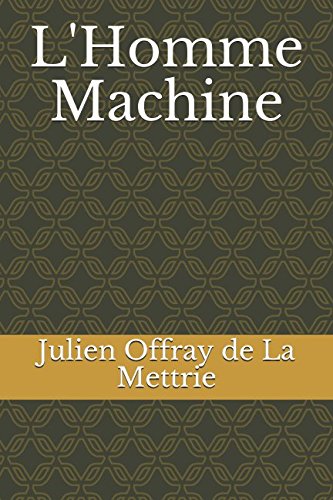
(On sera peut-être surpris que j'aie osé mettre mon nom à ...)
On sera peut-être surpris que j'aie osé mettre mon nom à un livre aussi hardi que celui-ci. Je ne l'aurois certainement pas fait, si je n'avois cru la Religion à l'abri de toutes les tentatives qu'on fait pour la renverser; & si j'eusse pu me persuader, qu'un autre Imprimeur n'eût pas fait très volontiers ce que j'aurois refusé par principe de conscience. Je sais que la Prudence veut qu'on ne donne pas occasion aux Esprits foibles d'être séduits. Mais en les supposant tels, j'ai vu à la première lecture qu'il n'y avoit rien à craindre pour eux. Pourquoi être si attentif, & si alerte à supprimer les Argumens contraires aux Idées de la Divinité & de la Religion? Cela ne peut-il pas faire croire au Peuple qu'on le leurre? & dès qu'il commence à douter, adieu la conviction, & par conséquent la Religion! Quel moien, quelle espérance, de confondre jamais les Irréligionnaires, si on semble les redouter? Comment les ramener, si en leur défendant de se servir de leur raison, on se contente de déclamer contre leurs murs, à tout hazard, sans s'informer si elles méritent la même censure que leur façon de penser...
http://www.amazon.com/gp/product/1976780624/?tag=2022091-20
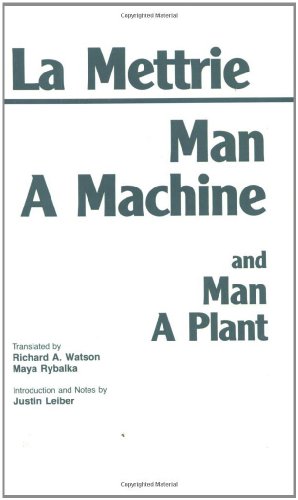
( The first modern translation of the complete texts of L...)
The first modern translation of the complete texts of La Mettrie's pioneering L'Homme machine and L'Homme plante, first published in 1747 and 1748, respectively, this volume also includes translations of the advertisement and dedication to L'Homme machine. Justin Leiber's introduction illuminates the radical thinking and advocacy of the passionate La Mettrie and provides cogent analysis of La Mettrie's relationship to such important philosophical figures as Descartes, Malebranche, and Locke, and of his lasting influence on the development of materialism, cognitive studies, linguistics, and other areas of intellectual inquiry.
http://www.amazon.com/gp/product/0872201945/?tag=2022091-20
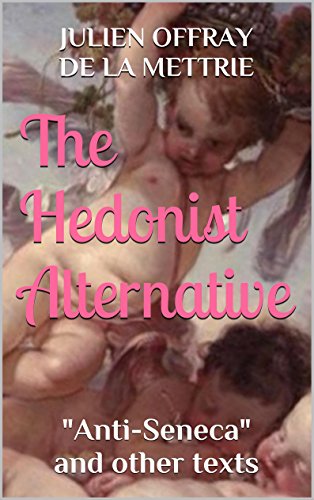
(If we accept this world as the only real one, and that al...)
If we accept this world as the only real one, and that all we are and all we do is predetermined by the mechanical laws of nature, what will become of our morals, what will be the meaning of life? How can we find happiness in a world like that? Julien Offray de la Mettrie (1709-51) explores these issues, drawing on his experience and training in medicine. His conclusions were too radical even for his fellow Enlightenment thinkers; Voltaire once wrote that "there's a great difference between fighting the superstitions of mankind, and breaking all social bonds and the fetters of virtue. La Mettrie would have been dangerous if he hadn't been completely insane." (Voltaire, Letter MDCCCIII, 27 Jan. 1752). This e-book contains the following texts, some in their first-ever English translation: "Anti-Seneca", or "On Happiness" "The System of Epicurus" A chapter on hedonism from "The Natural History of the Soul" "A Summary of Philosophical Systems"
http://www.amazon.com/gp/product/B00Q3K6N3O/?tag=2022091-20
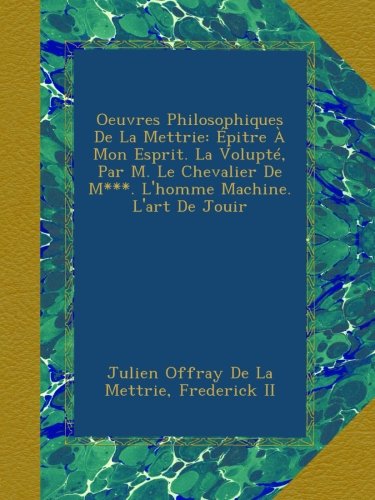
(This book was originally published prior to 1923, and rep...)
This book was originally published prior to 1923, and represents a reproduction of an important historical work, maintaining the same format as the original work. While some publishers have opted to apply OCR (optical character recognition) technology to the process, we believe this leads to sub-optimal results (frequent typographical errors, strange characters and confusing formatting) and does not adequately preserve the historical character of the original artifact. We believe this work is culturally important in its original archival form. While we strive to adequately clean and digitally enhance the original work, there are occasionally instances where imperfections such as blurred or missing pages, poor pictures or errant marks may have been introduced due to either the quality of the original work or the scanning process itself. Despite these occasional imperfections, we have brought it back into print as part of our ongoing global book preservation commitment, providing customers with access to the best possible historical reprints. We appreciate your understanding of these occasional imperfections, and sincerely hope you enjoy seeing the book in a format as close as possible to that intended by the original publisher.
http://www.amazon.com/gp/product/B009PJQXK8/?tag=2022091-20
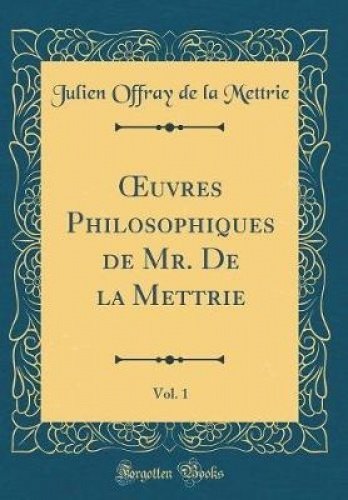
(Excerpt from uvres Philosophiques de Mr. De la Mettrie, ...)
Excerpt from uvres Philosophiques de Mr. De la Mettrie, Vol. 1 Tel ell le premier point de vue le plan de ce drfcours; avançons développons toutes Ces idées vagues générales. About the Publisher Forgotten Books publishes hundreds of thousands of rare and classic books. Find more at www.forgottenbooks.com This book is a reproduction of an important historical work. Forgotten Books uses state-of-the-art technology to digitally reconstruct the work, preserving the original format whilst repairing imperfections present in the aged copy. In rare cases, an imperfection in the original, such as a blemish or missing page, may be replicated in our edition. We do, however, repair the vast majority of imperfections successfully; any imperfections that remain are intentionally left to preserve the state of such historical works.
http://www.amazon.com/gp/product/0428220770/?tag=2022091-20
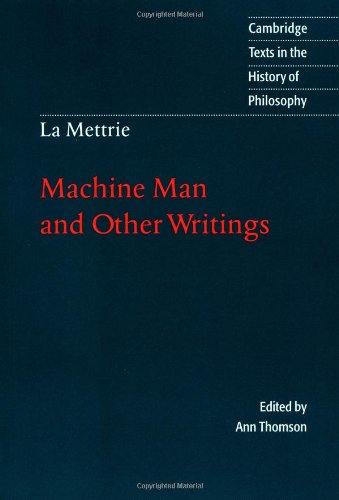
(Julien Offray de La Mettrie (1709-51), author of Man a Ma...)
Julien Offray de La Mettrie (1709-51), author of Man a Machine (1747), was the most uncompromising of the materialists of the eighteenth century, and the provocative title of his work ensured it a succès de scandale in his own time. This fully annotated edition presents a new English translation of the text together with the most important of La Mettrie's other philosophical works, translated into English for the first time. Ann Thomson's introduction examines his aims and the scandalous moral consequences which he drew from his materialism.
http://www.amazon.com/gp/product/0521478499/?tag=2022091-20
The son of a tradesman, Julien de La Mettrie was born in Saint-Malo in Brittany on December 25, 1709. He was the son of a prosperous textile merchant.
Intended for the priesthood, he studied humanities at Coutances, rhetoric at Caen, and logic at the College of Plessis in Paris.
But this theological interest was short-lived, and in 1725 La Mettrie began 2 years of natural philosophy at the College of Harcourt.
He received his degree in medicine at Rheims in 1728 and for the next 5 years practiced medicine in his native city.
In 1733 La Mettrie went to Leiden to study with the reknowned philosopher and physician Hermann Boerhaave. Soon La Mettrie was translating Boerhaave's works and adding his own observations-including treatises on venereal disease, vertigo, smallpox, and practical medicine and a six-volume commentary on Boerhaave's writings.
La Mettrie's absorption with medicine persisted after his return to Saint-Malo. La Mettrie's Parisian sojourn in 1742 secured for him a commission as physician to the troops of the Duc de Gramont.
On the battlefield at Freiberg, La Mettrie himself became sick with fever. During his illness he was struck with how much a disturbance in the body affects the thought of man. This thesis was elaborated in his Histoire naturelle de l'âme (1745), a work that was violently denounced because of its atheistic materialism.
La Mettrie was required by the regiment chaplain to relinquish his post with the army and then made to leave France.
By 1748 his works were burned even in Holland, and he was forced to flee. La Mettrie accepted Frederick the Great's offer of sanctuary in Prussia and lived there from February 1748, an intimate and witty companion of Frederick, a practicing physician for his friends, and a productive writer. L'Homme plante appeared in 1748.
Placing man in the scale of beings, that work suggested the evolution and interrelation of beings. There too La Mettrie proposed-as did Étienne Bonnot de Condillac-that the the degree of a creature's intelligence depends on the variety and number of needs experienced by that being. Three works detailing the social and ethical consequences of La Mettrie's view of man followed: L'Anti-Sénèque, ou Discours sur le bonheur (1748), Le Système d'Épicure (1750), and L'Art de jouir (1751).
With an irony La Mettrie would have enjoyed, his death was early and unexpected. He was at the home of a friend in Berlin, asked there as a physician. Having eaten abundantly from an elaborate but spoiled pâté, he died of food poisoning on November 11, 1751.
He is best known for his "Man a Machine, " an incisive and witty exposition of his theory of the dependence of mind on body. In 1746 La Mettrie fled to Leiden. There in 1747 he published anonymously his infamous work, L'Homme machine ( Man a Machine), audaciously and impishly dedicating that radical work to the pious scholar Albrecht von Haller.
(If we accept this world as the only real one, and that al...)
( The first modern translation of the complete texts of L...)
(In this fifth collection of La Mettrie's writings, he tak...)
(Julien Offray de La Mettrie (1709-51), author of Man a Ma...)
(This collection of literature attempts to compile many of...)
(A "bold atheist", a "renowned glutton", an "enemy of doct...)
(This book was originally published prior to 1923, and rep...)
(He's known for his audacious claim in 'Man a Machine' tha...)
("Let us boldly conclude that Man is a Machine; and that i...)
(On sera peut-être surpris que j'aie osé mettre mon nom à ...)
( Julien Offray de La Mettrie: Der Mensch eine Maschine. ...)
(Excerpt from uvres Philosophiques de Mr. De la Mettrie, ...)
Julien de La Mettrie is considered one of the most influential determinists of the eighteenth century. Along with aiding the furthering of determinism he considered himself a mechanistic materialist.
He believed that mental processes were caused by the body. He expressed these thoughts in his most important work Man a Machine. There he also expressed his belief that humans worked like a machine. This theory can be considered to build off the work of Descartes and his approach to the human body working as a machine.
La Mettrie believed that man, body and mind, worked like a machine. Interestingly, although he helped further Descartes' view of mechanization in explaining human bodily behavior, he argued against Descartes' dualistic view on the mind. His opinions were so strong that he stated that Descartes was actually a materialist in regards to the mind.
Quotations: La Mettrie held that "Nature has destined all of us solely to be happy. Yes, all, from the worm that crawls to the eagle that disappears into the night. "
He married in 1739 but the marriage, which produced two children, proved an unhappy one.
